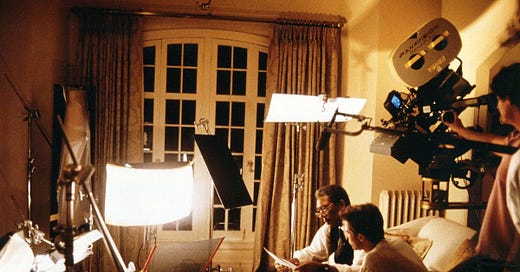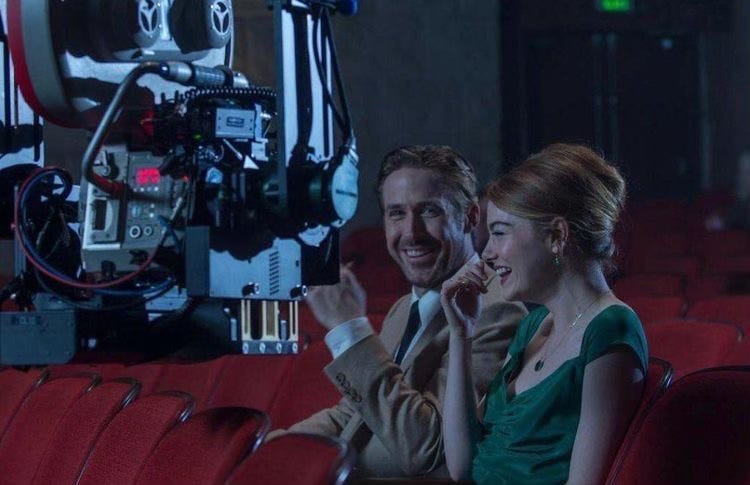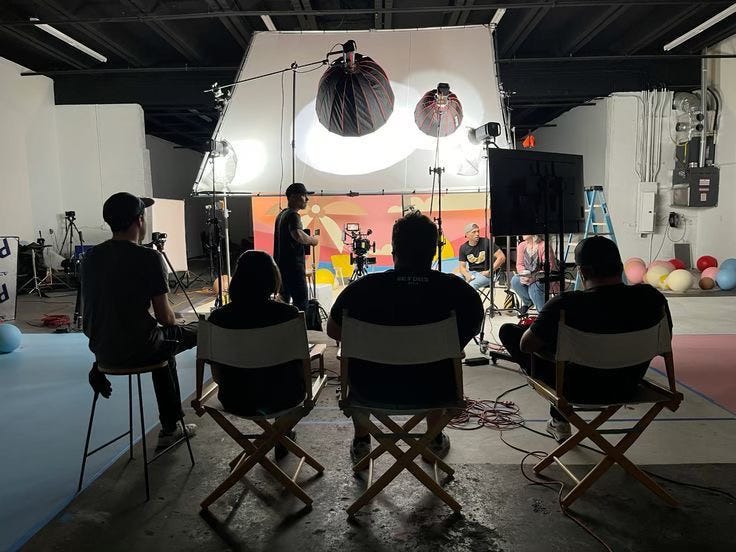How to Become a Director: 101 (a general overview)
This is a concise general roadmap of actions you can take right now to start paving your way toward becoming the next Kubrick, Wes Anderson, Justin Triet, or Coralie Fargeat.
If you’re unfamiliar with their work, there’s a lot to discover. But one thing you should understand is this: don’t aim to be them. Appreciate their films, study their craft, but always make room for your own voice in storytelling. It's your unique style that will elevate you, not imitation. True greatness comes from carving your own path—because being original is what transforms you from just another commercial director into an icon.
More articles are available on my newsletter, delving deeping into each point mentioned here, and more, fully giving you the secret sauce for how to become not just a director but a successful one.
So, where do we even start?
Well, to become a director is not merely to step into a role; it’s to occupy a world. To decide, for better or worse, that the stories of others are not enough. You must forge something entirely new—real, imagined, fantastical, and yet undeniably your own. The journey to the director's chair is long and strange, filled with unpredictable turns and lessons that hit like a punch in the gut, but it's one that, when approached with sincerity, rewards the restless and the curious.
In this process, there is a temptation to take shortcuts, to adhere to the belief that someone else will hand you the magic formula for success. The truth, however, is much simpler and far more complex: the only way to become a director is to stop pretending and start doing. You must immerse yourself, not in the “how” but in the why—why you want to direct, why you care about stories, and why, above all, you think it matters.
So, if you’re serious about taking that step from aspiring filmmaker to director, here’s a practical guide, peppered with steps to get you from how to done - from creating your first film to sitting comfortably in the director’s chair.
Watch Everything - Critically
First things first: watch films, documentaries, TV shows, anything with a visual language. But, crucially, don’t just watch them for entertainment. Watch with the eye of a filmmaker. Ask yourself what the director was trying to achieve. Was it successful? Was the pacing right? What was the camera doing? These questions will help you develop your own sensibilities.
A few YouTube channels to kickstart your critical watching:
Lessons from the Screenplay (https://www.youtube.com/c/Lessonsfromthescreenplay) This channel breaks down movie scripts and explains why certain choices work (or don’t).
Film Courage (https://www.youtube.com/c/FilmCourage) Interviews with directors and other industry professionals, offering practical advice and insights.
Every Frame a Painting (https://www.youtube.com/c/EveryFrameaPainting) Though no longer active, the existing videos are a treasure trove of visual storytelling analysis, particularly about the work of directors like Edgar Wright and Quentin Tarantino.
Learning the Craft - Formally or Informally
Film School vs. Self-Taught
One of the most debated questions when aspiring to become a director: Do you go to film school, or can you learn everything by doing it yourself? The answer is nuanced. Film school offers a structured environment to hone your craft, and the network you build there can be invaluable. It also provides access to equipment you might not afford on your own.
Some of the most respected film schools in the world include:
- US: University of Southern California (USC)
- UK: National Film and Television School (NFTS)
- France: La Fémis
- Australia: Australian Film, Television, and Radio School (AFTRS)
There are many more, and choosing can be difficult. Therefore, I’ll have another article up on this topic soon ;)
If film school isn’t for you, in your budget, or timeline: don’t despair. A lack of formal education won’t stop you from becoming a director. Instead, embrace the many resources available for free or at a low cost:
MasterClass: (masterclass.com) offers lessons from celebrated directors like Martin Scorsese, Ron Howard, and Spike Lee.
Film Riot: (https://www.youtube.com/c/FilmRiot) offers fun and informative tutorials on filmmaking, from camera techniques to visual effects.
No Film School: (nofilmschool.com) is a fantastic resource for articles, videos, and community discussions that demystify the entire process of filmmaking. They also host educational workshops.
Where to start:
Create Short Films - Start Simple, Think Big
The only way to really learn directing is by doing. Your first projects will likely be rough, but that’s part of the process. Start by making short films, even if they’re just 1-5 minutes long. They don’t need a massive budget—your smartphone is more than enough to begin with. Get creative with your resources, learn how to work with a small team, and experiment with what you can achieve.
Write a Simple Script: Keep your story simple but emotionally engaging. Focus on core human emotions and relationships—don’t overwhelm yourself with complex plots or special effects.
Collaborate: Find a group of actors, friends, or fellow filmmakers to work with. Filmmaking is a collaborative art form, so learning how to lead a team is just as important as learning how to shoot.
Editing: Editing is where a director's vision truly comes to life. Get hands-on with basic software like iMovie or Adobe Premiere Pro. You’ll learn a lot from piecing together the film after the shoot.
Seek Feedback - Don’t Be Afraid of Criticism, take as much of it. You can only ever improve.
As you begin creating, share your work with people who will give you honest, constructive feedback. This is one of the hardest things for filmmakers to do, but it’s a crucial step in growing as a director. Whether it’s friends, family, or professionals in the industry, getting feedback will help you understand where your strengths and weaknesses lie.
A great place for feedback:
Film Freeway (filmfreeway.com)
Submit your films to festivals—this can be a humbling and rewarding experience. You'll get feedback and build your portfolio, even if you don’t win.
Reddit’s r/Filmmakers (https://www.reddit.com/r/Filmmakers)
A helpful online community for filmmakers to discuss work, share resources, and give feedback on short films.
Master Your Collaboration skills - Acting, Cinematography, Editing
You are the one who pull al the strings. You need to make sure you can balance the choas or proudvtion whilst still staying focused on the shot itself. While you’re learning to direct, make sure to immerse yourself in other areas of filmmaking. A director’s job is deeply collaborative, and understanding the tools of the trade for your crew will help you communicate better on set.
Learn Cinematography: Watch tutorials on camera techniques and lighting. A great place to start is Philip Bloom’s (https://www.youtube.com/c/PhilipBloom) YouTube channel, where he shares insights about shooting with different cameras and techniques.
Acting: You don’t have to be an actor, but understanding how to work with actors is essential. Watch behind-the-scenes content of directors working with their casts. Directors like David Fincher and Steven Spielberg are known for their strong collaboration with actors.
Build Your Portfolio and Network - Show What You’ve Done, and be proud.
As you create, start building your portfolio—this is your calling card to future opportunities. Upload your work to platforms like YouTube or Vimeo. But don’t just stop there. Submit your films to festivals (even small ones) to build credibility. This is your ticket into the world of filmmaking beyond your immediate circle.
Film Festivals
Where dreams are shown, told, and made.
Submit your films to Sundance, Cannes Short Film Corner, and Tribeca Film Festival (among others). It’s the best way to get your work in front of the right people.
Networking
Join industry-specific groups on LinkedIn, attend festivals (even as an attendee), and engage with people online. Filmmaking is as much about networking as it is about your work.
Keep Pushing Forward - Develop Your Own Voice
As you grow, you’ll face setbacks, doubts, and failures. But here’s the thing: these are the moments that will define you. Directors rarely get everything right, but the ones who make it are the ones who keep going, no matter what.
Make it your mission to develop your own unique voice. You will be influenced by the directors you admire, but ultimately, the films that will set you apart are the ones that come from your personal experiences and vision.
In the end, becoming a director is an ongoing journey. There's no one-size-fits-all path, but if you watch everything, create endlessly, learn tirelessly, and push yourself to never stop growing, you’ll eventually see your name in the credits.
So, how do you become a director? You begin by not pretending to know the answer. And then, you begin by making something. Anything. The rest will follow.
Some of the points above were kept short to allow for a general overview of focus points for you, and others on how to become a director. However, there will be more articles soon delving deeper into each topic, like Film Schools, Self-study, Funding, Networking, Film Festivals, and many more.
Happy to help. Make sure to subscribe! Please share, like, and comment. Looking forward to what everyone thinks of the Filmstack Newsletter. If you have any feedback or think I’ve missed something, I’d be happy to edit and add it in.
Until next time, and make sure to live in the moment - one frame at a time.












